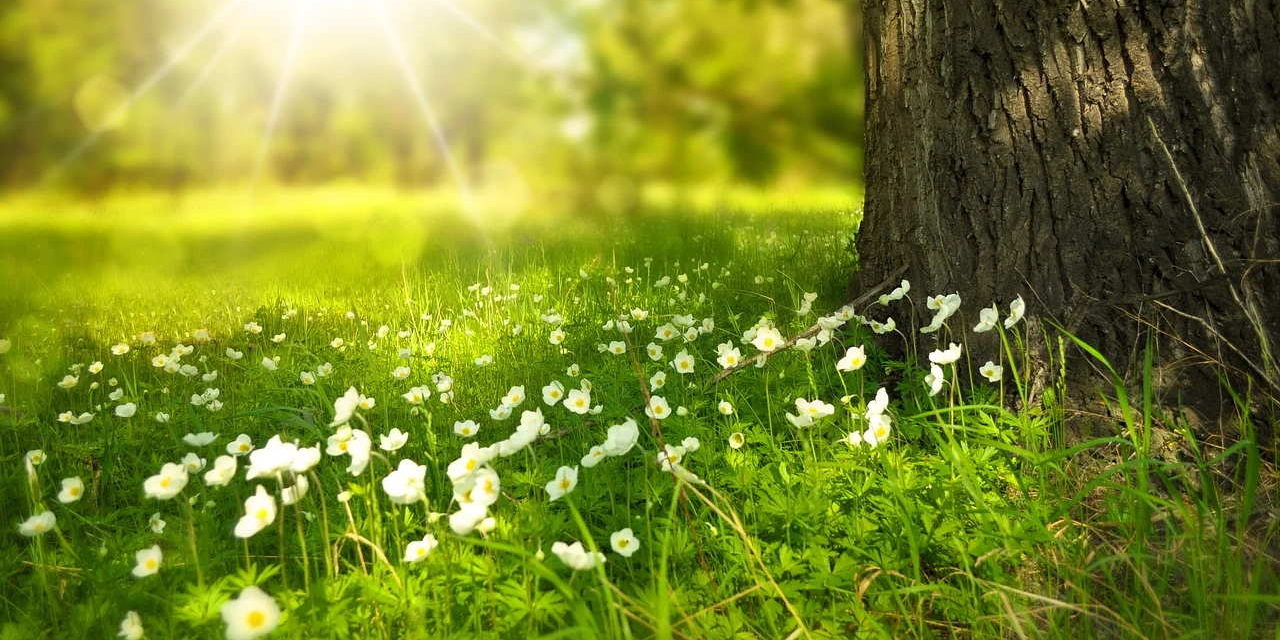Warming Up!
Chit-Chat
1. Divide the class into five groups. Discuss in the group the following points. Give one point to each group.
(a) Seeds regerminate from another seed.
Ans: Plants give us the best example of cycle of life in nature. A plant is always formed from a seed. The seed of a plant needs to be germinated in soil. With adequate water, sunlight and nutrients from the soil, the seed slowly starts to form into a plant. From a small fragile stem that comes out of the seed, the plant continues to grow into a strong living organism that eventually bears fruits and flowers. From the fruits, we again get seeds for the plant. When the seeds from the new fruits are germinated in soil, we again go through the life-cycle and get new plants. Hence seeds regerminate from another seed and we get continues supply of the same plant.
(b) Plants and flowers wilt and become one with the earth.
Ans: Plants and the beautiful flowers that grow on them have a life of splendour. They appear with all their beauty and help us humans in a number of ways. However, the life of a flower and many plants are quite short. Once their time is up, they start to wilt. The flowers fall first to the ground. As the plant goes through its life, it too starts shedding its leaves and eventually a dead plant becomes bare. It too starts to wither away falling slowly on the ground below. However, even in death, plants and flowers maintain their giving nature. When they wilt, they slowly start to form part of the soil or earth again. When they are completely wilted, they become one with the earth and release all their nutrients in the soil thus helping other plants to grow.
(c) Cacti thrive in the desert region.
Ans: Cacti are a special kind of plant that grow in hot conditions mainly in desert regions. They love heat and prefer conditions with lots of sunlight. Studying cacti is quite fascinating as you get to learn how they are able to survive in such harsh conditions. Firstly, the roots of cacti are able to spread well below the surface in search of water. When it does find water, it is able to store this water in its body, slowly releasing it as and when required. Cacti also have tough spines or what you see as leaves. This tough exterior helps it from prey, animals or other beings trying to harm the plant. All this helps cacti to thrive in harsh and hot desert regions.
(d) Bare nature turns green in spring.
Ans: As seasons change, so does the way nature changes its appearance. It starts from the months of Autumn when trees start to shed their leaves. Before shedding leaves, they turn into an incredible array of colours including red, yellow and orange. Through Autumn, the leaves of a tree change colour and slowly start to wilt. They eventually fall to the ground. By the time winter arrives, trees shed their leaves, flowers etc and appear completely bare. However, that does not mean the trees are dying. In fact, it is one of the most mesmerizing plays of nature. New leaves and flowers start to bloom as soon as winter ends and we approach the season of spring. During spring, the trees are once again filled with lush greenery. This is the cycle of nature as per the seasons. You get to experience nature with its bare minimum as well as in its complete glory. It also teaches us that appearance do not matter. As things can change with the passing of time.
(e) Caterpillar turns into butterfly.
Ans: The caterpillar insect is actually the larvae stage of butterflies and moths. Caterpillars are known to be heavy eaters. They need to eat almost continuously so that they can go through the various stages that turn the insect into a beautiful butterfly. Typically it takes about 7 to 11 days for a caterpillar to go through the next stage which is called Pupa or Chrysalis. From there, it can take another 14 days for the adult butterfly to form. Caterpillars are one of nature’s most intriguing creatures. This is due to the fact that from a seemingly ugly small insect, it turns into such a beautiful butterfly with incredible colour and design. They are able to grow wings and fly like other insects from its larvae stage.
2. Role of Nature
Discuss in pair, the role played by nature and complete the web diagram.
Role of Nature
• Help all living beings to survive.
• Provide us with food and water.
• Provide nutrients and ingredients for medicines.
• Help heal our minds and be one with nature.
Nature – the best teacher
• Teaches us perseverance.
• Teaches us to have patience.
• Teaches us that no matter how small, you can achieve what seems impossible.
• Teaches us to work together.
• Teaches us to live in harmony.
• Teaches us the value of our Mother Earth.
• Teaches us beauty lives within everything irrespective of what they may seem in the outside.
• Teaches us about life-cycle and everything shall pass no matter what.
3. Look at the following things. Discuss with your friend, what you learn from them.
(a) A bee
Bees teach us the value of what we can achieve if we all work together.
(b) An eagle
Eagles teach us how to focus on what is important and not indulge in unnecessary affairs.
(c) A creeper
Creepers teach us that you can go around any obstacle and continue to grow.
(d) The river
The river teaches us that you need to always go ahead like a river continues to flow through even the smallest of outlets.
(e) Rainfall
Rainfall teaches us several lessons such as to see beauty in simple things, to learn that both excess and shortage are bad. Considering without rainfall we would not have water to drink and with excess rainfall we would have flooding and destruction. Hence any extreme is bad for us.
(f) Sun
The sun teaches us to shine everyday no matter what. Whatever may be the conditions, we need to come out like the sun, shine brightly and live our life with vigour and be punctual.
From the Chapter Pages
Explain the line – ‘Nature whispers and commands’
Ans: The line ‘Nature whispers and commands’ means that nature does not tell us what to do in a loud, angry manner and yet human beings can never go against nature. Ultimately, we have to do as nature wants. Hence, nature is a great leader that gets the job done without making any extravagant noises or gestures.
What smiles with the sun and dances with the wind?
Ans: The hibiscus flower smiles with the sun and dances with the wind.
What lesson do we learn from the hibiscus plant?
Ans: The lesson we learn from the hibiscus plant is to live our life in full splendour. We should live our life to the fullest no matter how short it is.
What kind of rock did the author find on the beach?
Ans: The author found a rock that was carved, sculpted and shaped by the water of the ocean.
The rock is hard, but is it dominating? Give reason for your answer.
Ans: The rock is not dominating. The reason for this is that the rock may be hard but ultimately it gives in and takes the shape the water commands. The water from the ocean through the years carve, sculpt and shape the rock the way it wants.
In what condition was the tree in cold winter month?
Ans: The tree was bare of all leaves in the cold winter months
What do we learn from small bits of grass?
Ans: The lesson we learn from small bits of grass is that however impossible things may look, there is always an opening.
What do we find in the infinite sky?
Ans: We find innumerable stars shining across the infinite sky
How can learning from nature help human beings?
Ans: Learning from nature can help human beings in so many ways. To begin with, from nature, we learn the value of perseverance and patience. We can motivate ourselves knowing how difficult a situation may be, it will pass and we always have hope. Things can change in due time and we too can evolve just like bare nature turns to incredible beauty with changing seasons.
English Workshop
1. Go through the text again and complete the web that highlights the various features of flower of ‘hibiscus’ plant. One is done for you.
Features of flower of hibiscus plant
• Flower blooms every fortnight.
• It is big, bright and tender.
• As evening approaches, it starts wilting.
• It withers completely and by evening it falls and becomes one with the earth again.
2. The writer explains the contrasting features of ‘water’ and ‘rock’ in the text. Write all the features of both water and rock in the given table.
Water
• Gentle
• Water commands
• Water flows
• Water is persistent.
Rock
• Hard
• Rock gives in
• Rock is moved by water
• Rock gets carved, sculpted and shaped by the water.
3. Impossible itself says ‘I M possible’. Do you agree? Justify your answer by citing some examples from the text and some that you have experienced or heard from someone.
Ans: I agree with the statement that everything is possible. The following examples justify my answer
• Ants are so tiny and fragile and yet they are able to lift up more than 10 times their weight. Army of ants working together can even pick up a huge fly or insect on their backs.
• Huge rocks on the beach, no matter how hard, strong and colossal, get carved, shaped and sculpted by the water. As water continues to flow and is persistent, the rock gives in and has to do what the water commands.
• I have seen on television about a girl who was born without hands. Yet today, she is an incredible painter as she learned to use the toes of her feet to paint.
• I have heard of a person who was blind and yet they managed to climb Mount Everest.
4. Find synonyms from the text for the following words/phrases.
(a) strong feeling of fear or respect
Ans: Awe
(b) to direct authoritatively
Ans: Commands
(c) to peer through
Ans: Peeping through
(d) large and impressively beautiful
Ans: Majestic
(e) easily broken or damaged
Ans: Delicate
5. How can you prove this maxim to be incorrect – ‘Too many cooks spoil the broth’. Write a counterview on the given topic. (Clue -Teamwork)
Ans: The saying ‘Too many cooks spoil the broth’ typically means if too many people try to work on the same thing, then we end up spoiling it more. While it may be true sometimes, it is not always the case.
Let us take the examples of ants. Even though ants are so small with seemingly fragile body, when ants work together, they can even pick up large flies and insects. They regularly carry 10 to 50 times their weight when they work together. An army of ants can lug around a huge fly quite a distance by working together. They organize themselves around the insect and lift it up on their frail feelers. Hence over here, teamwork triumphs over anything else. Similarly in life, we can take lessons from nature and work together ourselves to achieve our goals. If we human beings believe in teamwork, then nothing is impossible. Just like in sports such as Cricket or Football where the team has to work together to win, similarly in life, we all must work together to uplift our society.
6. Make a list of all the words related to the word ‘ocean’.
• Fishes
• Salty
• Water
• Beach
• Rocks
• Kelp
• Coral
• Waves
7. The author has very positively described the different things in nature. Discuss with your partner the special features of each one of them. Add on the list.
1) Part of Nature: Water
Special Feature: It is gentle, flows where it can and has no ego but can shape rocks overtime.
Value Learnt: It does not matter how colossal our problems are, we can overcome it if we remain persistent.
2) Part of Nature: Rainbow
Special Feature: Colours the entire sky
Value Learnt: Beauty can appear at anytime and anywhere in nature.
3) Part of Nature: Caterpillar
Special Feature: Turns into a beautiful butterfly.
Value Learnt: Things can change and we should never judge someone by their looks.
4) Part of Nature: Hibiscus flower
Special Feature: It is big, bright and tender. Lives only for a day.
Value Learnt: We should live our lives to its fullest no matter how short.
5) Part of Nature: Grass
Special Feature: They can grow through any small cracks anywhere.
Value Learnt: However impossible things may look, there is always an opening.
6) Part of Nature: Tree
Special Feature: Bares its leaves in winter but is full of greenery in spring.
Value Learnt: We should have conviction that however difficult things are at the moment, it will not remain so forever. It will pass.
7) Part of Nature: Ants
Special Feature: They can carry 10 times their weight when they work together.
Value Learnt: We can achieve anything with teamwork and perseverance.
8) Part of Nature: Spider Webs
Special Feature: Delicate but strong
Value Learnt: Do not underestimate the power of things no matter how delicate or fragile they may seem.
9) Part of Nature: Oysters
Special Feature: They take in a grain of sand they open up with a pearl.
Value Learnt: We can always transform ourselves with the right ingredients.
10) Part of Nature: Wind
Special Feature: Can make trees dance.
Value Learnt: Even the strongest obstacles can be bent with persistence.
8. Your friend has his board exam. He studies for 14 hours a day sitting at one place. Write a letter to him giving him tips to relax and be stressfree.
Answer:
34 Shiv Chawl,
SV Road,
Santacruz West,
Mumbai – 400054
18th December 2020
Hi Ramesh,
How are you? I hope you and your family are doing well. I have been thinking about you a lot lately and just like you, I am busy preparing for my board exams.
Knowing you and by what I have seen in the past, I know you must be studying non-stop for the exam. You were always a good student and I like your commitment and hardwork a lot. You have always been an inspiration to me in that regard. However, I did want to tell you something that I feel is quite important. Considering how you study about 14 hours a day, that too sitting at one position, I feel I must tell you to relax and move a bit as well. Studying hard is definitely good, but if you overdo it, you may face health problems.
In fact it is a good thing to take a break once in a while and pursue things that make you feel good. Do things that relaxes you. This will in turn help you remember more of what you study. If you study continuously sitting at one position, your brain and body will suffer from fatigue. This will result in you forgetting things at a later date. By relaxing and also pursuing things you like, your brain will get the all important break it needs and your study time will be much more fruitful.
Also I need not remind you that sitting at one position may cause back problems and other health issues. It is good to stand up and even go for a walk if possible. Basically if you relax your mind and ensure your body is healthy, you will be able to study effectively and remember much more than now. It will ultimately help you in scoring even higher in your board exam.
I have always admired your persistence as well as study habits. I know you will do well in life. Just ensure you always take care of your health including relaxing your mind.
I can’t wait for our board exams to get over so that we can meet and have many adventures together. Please give my regards to your parents and tell them I will visit them soon. Until then, goodbye my friend and best of luck for your board exams.
Yours Affectionately,
XYZ
9. You have an Environment Protection Week to be celebrated in your school. You have invited an environmentalist. You have to interview him/her about how to save environment. Frame about 10-12 questions for the interview.
Answer:
1) What is the single most danger our environment is facing at the moment?
2) How can we as ordinary citizens help in saving the environment?
3) What changes would you like the government to implement for controlling pollution and creating a better environment for its citizens?
4) Why do you think there is such lack of intent when it comes to saving environment?
5) What are the alternate means of generating clean energy?
6) How do we reduce greenhouse gas emissions?
7) What can we do different in cities and villages to help save the environment?
8) What lifestyle changes should we make so that we don’t end up hurting the environment?
9) What is the main challenge you have faced so far as an environmentalist?
10) What can we do to bring more awareness about the environment in our society?
11) Name three things we need to do immediately to ensure the environment does not get worse.
12) What advise would you give anyone who wants to play a part in saving the environment?
10. Write a news report on the ‘Environment Day’ celebrated in your school.
Answer:
Environment Day Celebrated at Bal Vidya Mandir High School
Maya Rathod, Student Reporter
Mumbai, 21st December 2020
Bal Vidya Mandir High School in Santacruz West, Mumbai, celebrated Environment Day within its campus on Sunday, 20th December 2020. The celebrations saw a number of programs performed by the students as well as a speech from renowned environmentalist Sheila Minar.
Environment Day celebrations at Bal Vidya Mandir High School was an important occasion as students and everyone involved did their best to spread awareness about our precious environment. There were presentations, dramas and performances, all relating to the theme of environment. The main topic of discussion was how to save the environment and what we as ordinary citizens can do to help with the situation. The highlight of the day though was a speech by environmentalist Sheila Minar. Mrs. Minar was the chief guest at the environment day celebration. Her presence generated a lot of excitement amongst the students considering her role in helping our country fight environmental issues. Her speech was very well thought out and contained a number of practical solutions for our environment. She even gave the students important tips on how each one of us can make a difference in the fight for a cleaner environment.
The entire environment day celebration was such a success that school management has decided to make it an annual affair. The goal was to not just create awareness in our society but also to share ways we can do our bit to create a better future for all of us.
11. Develop a story with the given ending. Give a suitable title and moral.
……and so, Aditi decided to plant more trees.
Answer:
Title: Aditi Learns a Costly Lesson
One day there was a girl named Aditi. She lived in a house in the countryside. Just outside her house, was a big tree. The tree was there since even before Aditi and her family had built the house many years ago. However, her entire family wanted more land so that they could develop other things. They thought, if we cut the tree down, then there will be more land to extend the house or build new sheds etc. After a lot of thought, the family’s greed took over and they ended up cutting the tree down.
In the coming days though, Aditi started to notice certain things. Firstly she would no longer wake up to the sweet chirping of birds as there were no branches anymore for the birds to sit. The entire house had got really hot as there was no shade from the tree any longer. During the summer months, sunlight came without any obstacles and hit the house, baking it like an oven. Aditi could not even play outside or smell the lovely flowers from the tree. What was worse though was when it was monsoon. During the rains, the outside grass and soil got uprooted completed and it was a big mess. The family realized without the tree’s roots to hold the soil, even with little monsoon there was chaos in the land and flooding as well.
One day when Aditi was coming back from school, she saw her house from the outside. It was a complete mess. The land around the house was uprooted. The colour of the walls were faded due to direct sunlight. Her house had completely lost its old charm. She then one by one started to realize the important role the tree was playing in their lives. Just because the tree did not speak and did its work quietly, Aditi and her family never realized all the things the tree was doing for them. It was then that Aditi had learnt her lesson. It was a costly lesson but now Aditi was determined to make a difference in the world and so, Aditi decided to plant more trees.
Moral of the story:
Just because trees can’t talk and do their work quietly, that does not mean they are not important to us. All trees play an extremely important role in human lives.
12. Just For Laughs!
Divide the class into two groups. On 12 to 15 slips of paper, Group A writes 12 to 15 conditional clauses beginning with ‘If’.
(For example, If I work very hard, )
Group B write 12 to 15 main clauses.)
(For example, I would/shall have a pizza.)
Now, one student from Group ‘A’ reads the first conditional clause (possibility) and one student from Group ‘B’ reads the first main clause. It forms crazy sentences, just for laughter and fun. ENJOY !
Answer:
1) If I work very hard – I would have a pizza.
2) If I get up late – I shall play video games.
3) If I go to school – I would jump up and down.
4) If the sun rises in the west – I would yell mummy save me.
5) If I get a phone call – I would marry a stranger.
6) If we win the match – I would break everything.
7) If the water drips on the floor – I would go ice skating.
8) If I started to meditate – I would lose my brains.
9) If I got hurt – I would sing a lullaby.
10) If I feel sad – I would ride a pony.
11) If I write a story – I shall cook with it.
12) If I came late – I would laugh for hours.
13) If I saw a movie – I would go mad.
14) If I was a teacher – I would kick the wall.
15) If I went trekking – I shall wear a dress.
Language Study
1. Match the pairs of Antonyms.
Direct answers given below.
1) Gentle – Strong
2) Impossible – Possible
3) Colossal – Small
4) Short – Long
5) Difficult – Easy
6) Delicate – Hard
2. Complete the table.
Answers:
1)
Noun: Strength
Verb: Strengthen
Adjective: Strong
Adverb: Strongly
2)
Noun: Passion
Verb: –
Adjective: Passionate
Adverb: Passionately
3)
Noun: Change
Verb: Change
Adjective: Changed
Adverb: –
4)
Noun: Organization
Verb: Organize
Adjective: Organizable, Organized
Adverb: Organizedly





